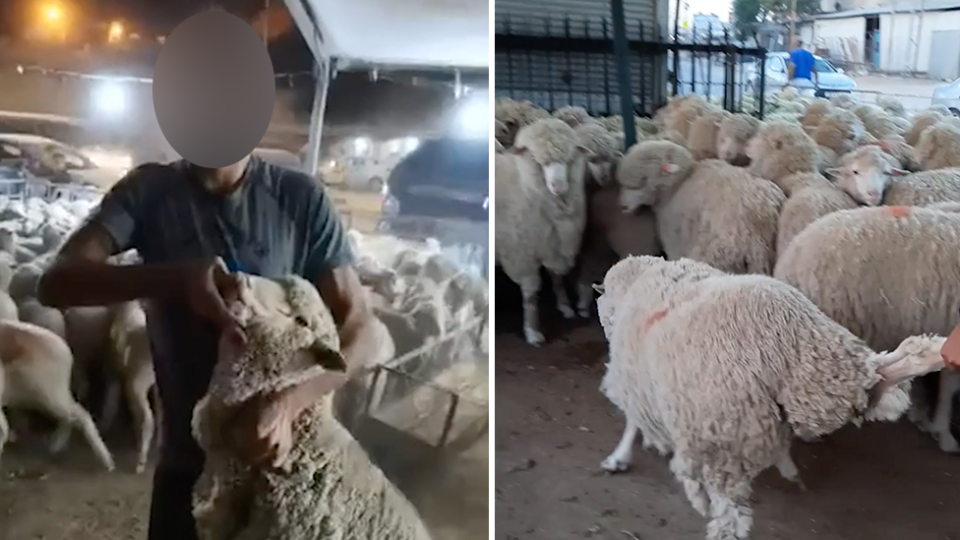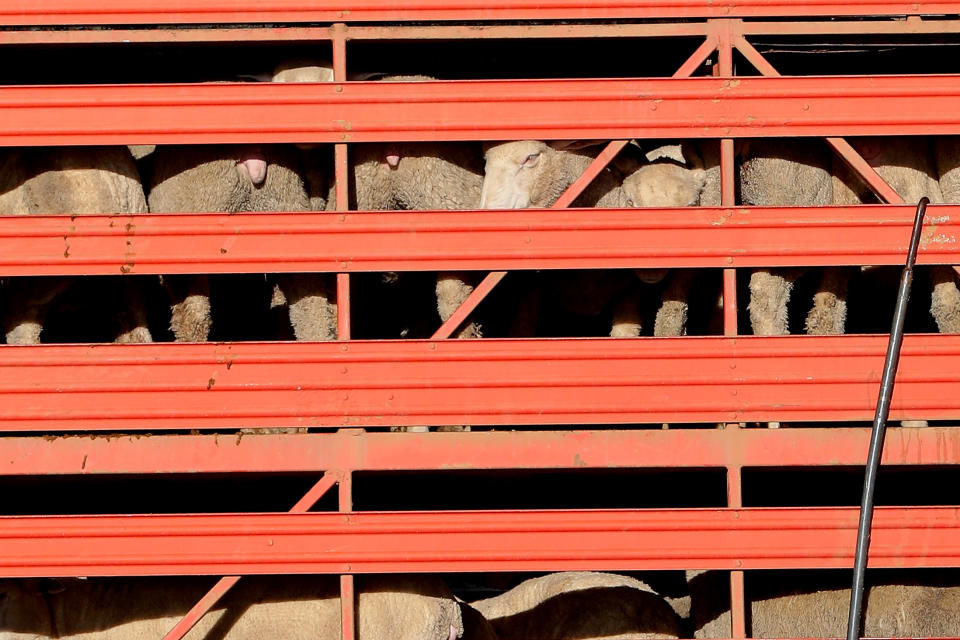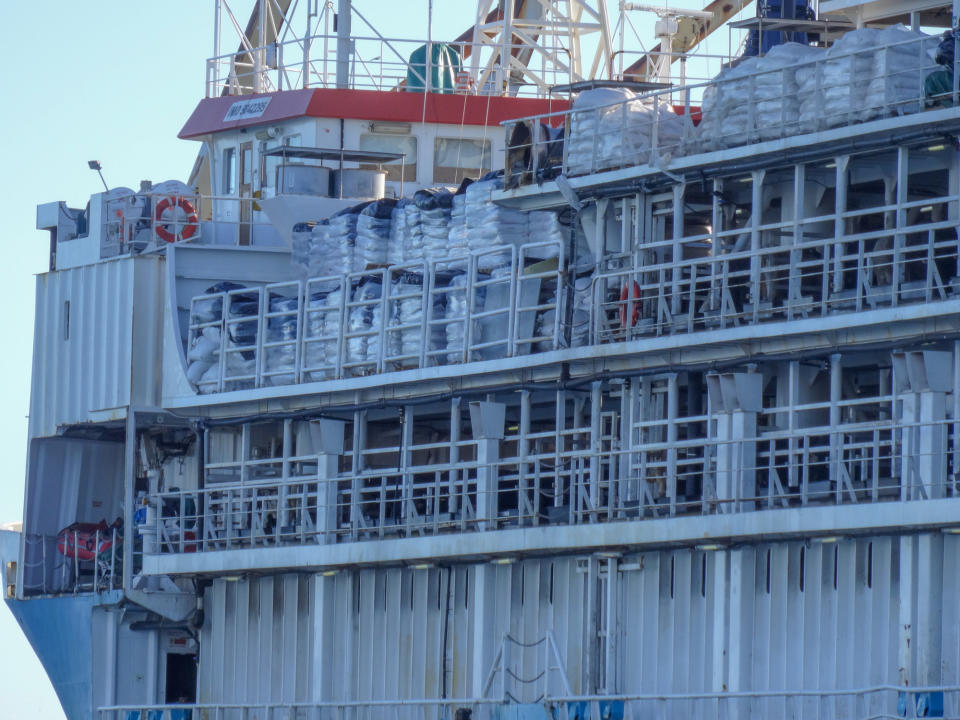Slaughtered in the street: Brutal treatment of Australian sheep caught on camera
WARNING - DISTRESSING CONTENT: Disturbing footage allegedly showing Australian livestock being brutally mistreated in the Middle East has led to calls for an urgent intervention.
Video obtained by Animals Australia shows sheep, which exporter Livestock Shipping Services (LSS) allegedly lost control of in Jordan, killed on the street.
Animals Australia said the video was shot two weeks ago in Jordan in 10 locations around the country during the lead-up to the Eid festival.
RSPCA Australia has viewed the video and asked for the government to monitor exported Australian animals with real-time CCTV and electronic tracking to prevent further abuse of animals.

The RSPCA says the video evidence shows the systems in place to protect animals exported overseas are not working.
Investigators say they encountered vendors openly advertising Australian sheep for sale after herding them from the back of a truck.
Video shows one large sheep is stuffed into a car boot, while another is lifted upside-down onto the back of a ute.
The camera then turns to show the street stained with blood, where some of the animals were butchered in the street and a row of dead sheep were lined up for sale on the ground. These pictures were too confronting to include in this story.
Coloured ear tags photographed in the ears of the sheep are said by Animals Australia to link LSS to some of the animals shown in the video.

‘Complete breakdown’: Call for overhaul of regulations
The federal Department of Agriculture is investigating a complaint lodged by Animals Australia over alleged breaches of ESCAS (Exporter Supply Chain Assurance System) regulations which require suppliers to ensure animal welfare up until the point of slaughter.
Past government investigations have taken many months, so on Monday the RSPCA called on authorities to immediately address what they say “appears to be a complete breakdown in supply chain controls”.
RSPCA Australia Senior Policy Officer Dr Jed Goodfellow said LSS’s alleged breaches involve thousands of animals.
“How many more animals need to be subjected to the fear and distress of having their legs bound, being thrown into car boots in the stifling heat, and subjected to makeshift home slaughter, before the Department of Agriculture will revoke this exporter’s licence?” Dr Goodfellow said.
“The current approach of simply applying additional conditions to an exporter’s supply chain during their next consignment has failed dismally – it has proven to be only a minor inconvenience rather than a sufficient deterrent.”
Government had vowed to address export cruelty
ECAS regulations were introduced by the government after explosive video aired on ABC’s 4 Corners in 2011, resulting in mass demonstrations and a call to end live animal export.
Then agriculture minister Joe Ludwig temporarily halted live export of cattle, but allowed for the trade to continue, insisting the regulations would address cruelty concerns.
Jordan-based LSS has been found to be in breach of Australia’s exporting rules 27 times since the ECAS was introduced.

Lisa Chalk from Animals Australia questions why the company has not had their licence suspended, arguing that if harsh action isn’t taken, further breaches will follow.
“It’s worth considering what a ‘regulatory breach’ means for the animals – being stuffed into car boots, dragged and killed in the streets or sold for backyard slaughter at the hands of untrained slaughtermen,” she told Yahoo News Australia.
“This is exactly the type of treatment ESCAS was set up to prevent yet we are still seeing animals suffer and we are still waiting for meaningful action to be taken against repeat-offending export companies.”
Reaction to breach shows system is working, exporters say
Once LSS became aware of a breach in its supply chain on July 28, it alerted the department of agriculture, and this shows the system is working, according to the industry representative body Australian Livestock Exporters’ Council (ALEC).
ALEC CEO Mark Harvey-Sutton told Yahoo News Australia that when LSS recognised the breach, they were “on the front foot”, working to recall a “significant number” of animals and ban the offending facility from its supply chain.
With 1.1 million sheep and close to one million cattle exported from Australia last calendar year, Mr Harvey-Sutton argues that the number of breaches are low and there are no indications the system is broken.

“These instances are clearly the exception,” he said.
“Now, I'm not not condoning them, nor excusing them, but they are clearly the exception.
“I think the net gain has been animal welfare improvements in the receiving markets that we send livestock to.”
Mr Harvey-Sutton said exporters have CCTV coverage of Vietnamese supply chains due to past “clear and egregious” breaches of ESCAS, but there currently isn’t a need to do so elsewhere.
He said exported cattle are already electronically tagged, but it is not practical to do so with sheep, and this he says demonstrates that RSPCA have a misunderstanding about how these types of systems work.

“Just because you detect a regulatory breach does not mean the regulations are failing,” he said.
“The RSPCA are welcome to their opinions and we’ll take on board their recommendations, but let's also be very clear that RSPCA Australia has a policy to end live exports as well,” he said.
“We need to put this in context and understand exactly what our industry is doing, and that is supplying food security to a number of nations that have depended on us right now.”
Government continuing their investigation into breach

The department of agriculture told Yahoo News Australia it is currently investigating the matter and has requested further information from the exporter.
“The exporter has identified the source of the loss of control which resulted in sheep leaving the approved supply chain,” a spokesperson said.
“The department has subsequently removed this facility from the exporter’s approved ESCAS supply chain and continues to investigate the matter.
“The department will take further appropriate regulatory action as necessary and will publish a report of the outcomes of its investigation,”
“The length of time an investigation takes depends on the circumstances of the individual case —information received needs to be verified, exporters must retrieve information from overseas markets, and sufficient time must be granted to allow procedural fairness for the parties involved.”
Livestock Shipping Services did not respond to a Yahoo News Australia request for an interview, but issued a statement, via ALEC, outlining the action they took after becoming aware of the ESCAS breach.
Do you have a story tip? Email: newsroomau@yahoonews.com.
You can also follow us on Facebook, Instagram and Twitter and download the Yahoo News app from the App Store or Google Play.




